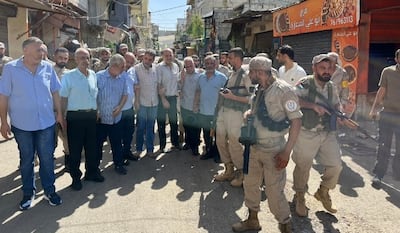Militants withdrew from eight UN schools in Lebanon's largest refugee camp on Friday as part of a co-ordinated operation by a Palestinian joint security force.
The armed groups had been barricaded within the schools in Ain Al Hilweh but agreed to withdraw as part of a ceasefire plan to stop months of battles between rival factions in the camp that was implemented earlier this month.
Maj Gen Mahmoud Al Ajouri, the head of the joint security force, told The National this week that Fatah – the camp’s dominant political faction – and rival Islamist militants had agreed to leave the schools simultaneously following talks with the Joint Action Authority – a body comprising Palestinian national and Islamist factions.
“Both sides agreed to leave on the condition that we tell them at least 24 hours in advance, which we have done,” he said on Wednesday.
The agreement to end two months of battles came as a result of mediation by political factions Hamas and Osbet Al Ansar with hardline Islamist militants, Maj Gen Al Ajouri said.
Hamas is the primary rival of Fatah in Palestine and the refugee camps in neighboring host countries, while Osbat Al Ansar is a Lebanon-based group of Palestinian and Lebanese nationals primarily operating in Ain Al Hilweh.

Armed militants – among them the Al Qaeda-affiliated Jund Al Sham – have barricaded themselves inside two compounds containing eight schools run by the UN agency for Palestinian refugees (UNRWA).
By long-standing convention, the Lebanese state does not have jurisdiction over Palestinian refugee camps, leaving residents to handle security.
UNRWA has warned that the occupation of the schools will delay the start of classes, affecting the education of more than 11,000 Palestinian pupils.
But militant withdrawal is only the first of many steps that are badly needed, UNRWA representative Hoda Samra told The National.
“We still have to be assured that it’s safe to enter the camp and the school compounds," she said.
"We need to contract a party for demining and removing unexploded ordinance. Then engineers and experts will have to do a proper assessment of the damage."
The UN will also have to ass the overall cost is for repairs and rebuilding, before asking donors for help "because we are short of funds”, Ms Samra said.
“At the end of the day this was a battlefield,” she added.
“We will not be operating until we know it’s calm and safe for students to return.”

The fighting, which escalated following the assassination of senior Fatah commander Abu Ashraf Al Armoushi, took place in August and September.
Clashes left at least 28 people dead, while hundreds of camp residents remain displaced.
Talks in mid-September between Fatah and Hamas gave Fatah's rivals – including more radical groups – a larger role in administering security in Ain Al Hilweh.
The recently resurrected joint security force, a result of those negotiations, is made up of Ain Al Hilweh’s various camp factions, allowing the force to operate as a neutral party.
It is now in charge of maintaining an uneasy ceasefire in the camp.
Following militants' withdrawal from the schools, the joint force will enforce security in neighbourhoods affected by the fighting in preparation for displaced families to return to their homes.
Fatah has promised forceful retribution if the alleged killers of Mr Armoushi are not surrendered to authorities, giving them an end of September deadline.
It remains to be seen whether the militants will surrender.
Ain Al Hilweh is the largest refugee camp for Palestinians in Lebanon, with a population of more than 70,000.


